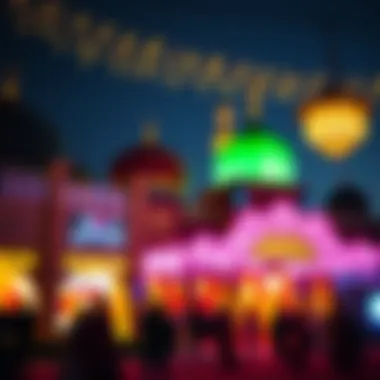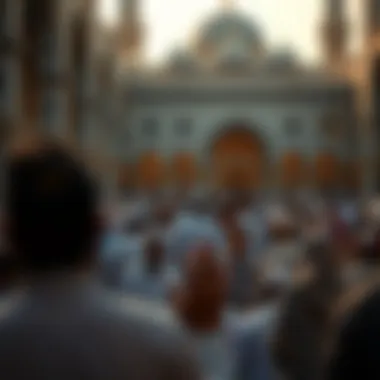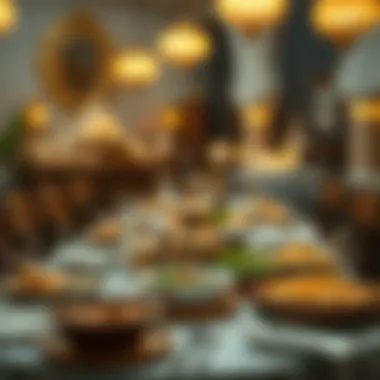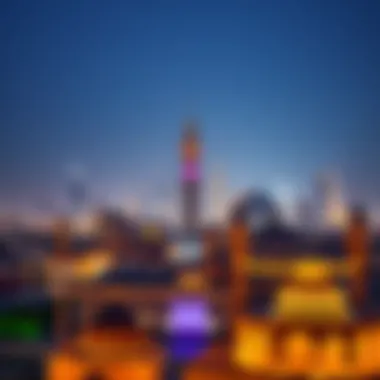Eid ul Fitr Holidays in UAE 2024: A Full Guide


Intro
Eid ul Fitr marks a joyous occasion that resonates deeply within the cultural fabric of the UAE. As the end of Ramadan approaches in 2024, this celebration stands to remind the community of the values of togetherness, charity, and gratitude. With a rich historical context intertwined with Islamic traditions, Eid ul Fitr is more than just a holiday; it is a time for reflection, family reunion, and cultural expressions.
In this overview, we’ll look beyond merely the holiday dates; we’ll also explore how this significant time impacts various facets of life in the UAE, particularly in Dubai. The festivities not only stir emotional and spiritual sentiments but also illuminate economic activities, including the real estate market. Understanding these layers can provide valuable insights, whether one is a resident, tourist, or investor considering opportunities during this festive period.
Thus, as we dive deeper into the implications of Eid ul Fitr in the UAE for 2024, we’ll navigate through cultural practices, travel advisories, and how the holiday shapes the property landscape in this vibrant emirate.
Historical Context of Eid ul Fitr in the UAE
Eid ul Fitr holds a pivotal position in the cultural and spiritual landscape of the UAE. As a time for both celebration and reflection, it marks the end of Ramadan, the holy month of fasting. Understanding the historical context of this event enriches one’s appreciation of its significance, particularly for those who invest time in the dynamic market of the UAE.
The Origins of Eid ul Fitr
Historically, Eid ul Fitr traces back to the time of the Prophet Muhammad. Following the completion of Ramadan, it was instituted as a day of celebration for the community, emphasizing gratitude for the strength shown during the month of fasting. In the UAE, the origins of this celebration are deeply intertwined with Islamic traditions, resonating through centuries of local culture and practices. The festivities symbolize not just a break from fasting but a reaffirmation of faith and community bonds. The rich tapestry of Arab culture further enhances these celebrations, with unique twists added that reflect the local heritage.
Eid ul Fitr Traditions in the UAE
In the UAE, Eid ul Fitr traditions are a vibrant blend of religious observance and cultural expression. The day begins with the communal Salat al-Eid, a special prayer held in mosques and open areas. This shared act reinforces unity among diverse communities in the UAE. Following the prayers, it's customary to engage in acts of charity, known as Zakat al-Fitr, ensuring that even the less fortunate can partake in the festivities.
The celebratory practices extend to families gathering for sumptuous meals, showcasing a variety of delectable dishes that reflect the rich culinary heritage of the region. In addition, gifting and visits from friends and family are common, symbolizing warmth and generosity.
Daily life in the UAE takes on a festive charm during this period, with neighborhoods decorated and filled with the sounds of laughter and joy. Such elements cultivate a sense of belonging and shared experience that resonates with expats and locals alike. The historical depth behind Eid ul Fitr not only enriches the present-day celebrations but also aligns closely with the values and market behaviors seen within the UAE’s fast-paced environment.
“Eid ul Fitr is not just a holiday; it's a reminder of the profound community spirit and cultural interchange that defines the UAE.”
For investors and businesses, recognizing the impact of Eid ul Fitr on community engagement can present insights into market trends, fostering a deeper connection with clients and consumers during this festive season.
Eid ul Fitr Dates and Duration
Understanding the dates and duration of Eid ul Fitr 2024 is essential for those residing and participating in the celebrations in the UAE. These dates not only mark a significant time for religious observance but also carry implications for travel plans, family gatherings, and commercial activities. The holiday period essentially serves as a bridge for community interaction, economic activity, and cultural exchange. Taking note of the expected timelines allows individuals to plan effectively, whether they are participating in local festivities or managing business operations that might be affected by the influx of visitors.
Expected Dates for Eid ul Fitr
Eid ul Fitr is celebrated at the end of Ramadan, and the exact dates can vary depending on the lunar calendar. For 2024, the anticipated dates for Eid ul Fitr are likely to fall around April 10th, depending on the sighting of the moon.
- Tentative Date: April 10, 2024
- Check for Confirmation: Always look for official announcements from local mosques or government bodies close to the date.
- Significance: This observance marks the end of a month of fasting and devotion, and it’s crucial for those wishing to engage fully in its celebrations to prepare in advance.
Public Holiday Schedule
The public holiday schedule for Eid ul Fitr is an important aspect for both residents and visitors in the UAE. The holidays typically extend beyond the day of Eid itself, allowing for ample time to celebrate with family and community.
In 2024, the expected holiday period may range from April 10th to April 12th. Here’s a breakdown:
- April 10, 2024: Eid ul Fitr Day (official public holiday).
- April 11 - 12, 2024: Public holidays, subject to official proclamation by the UAE government.
Planning ahead for this holiday schedule is beneficial:
- Travel Arrangements: Many people travel during this period, so securing flights and accommodations early is wise.
- Business Operations: Companies may operate on limited hours or may be closed, affecting services.
- Cultural Gerontology: Engaging in community events is easier when you understand when larger gatherings and celebrations will take place.
"Eid ul Fitr is not just about the celebratory feasts – it's also a time of giving, community bonding, and shared experiences that strengthen social ties."
To further enhance your holiday experience, consider planning participation in local events or gatherings as a way to immerse yourself in the cultural significance of this festive time. The anticipation of these dates helps frame the holiday within the broader context of personal and communal observance, making it an enriching period for reflection and connection.
Cultural Significance of Eid ul Fitr
Eid ul Fitr in the UAE is not merely a conclusion to Ramadan; it's a vibrant tapestry woven from the threads of culture, community, and spirituality. This holiday carries profound meaning that transcends individual observance, enveloping entire communities and providing an essential touchpoint for cultural identity. The celebration fosters unity among diverse groups, reminding everyone that regardless of backgrounds, they share in the joy and hope that this occasion brings.
Eid ul Fitr holds a particularly significant place in the hearts of residents and citizens alike. It encapsulates the spirit of giving and social responsibility, reinforcing values passed down through generations. The holiday serves as an opportunity for people to come together, strengthening bonds not just among families but within the larger social fabric.
Social Impact on Communities
The social dimension of Eid ul Fitr can be felt in every corner of the UAE. One of the most striking aspects of this period is how it promotes social solidarity. The atmosphere is charged with goodwill, as communities gather for prayers, share meals, and extend greetings to one another. Streets come alive with bustling markets, where everything from dates to decorations celebrates the occasion.


- Strengthening Community Ties: Eid festivities amplify community cohesion, as neighbors and families share in the joy of the holiday. It is a time for hospitality, where homes will often welcome guests for feasts, symbolizing friendship and unity.
- Cultural Exchange: In a cosmopolitan hub like the UAE, Eid is a moment to embrace cultural exchange. Visitors and expatriates are invited to partake in the rich traditions of the holiday, fostering understanding and appreciation of each other's customs.
- Youth Engagement: Children are particularly engaged during this festive period. They eagerly await their Eidi, the gifts or money given by elders. This rite of passage helps cultivate a sense of community belonging and shared joy among the younger generation.
"Eid ul Fitr shines as a beacon of hope and encouragement for communities to unite in love and generosity."
Charitable Practices During Eid
Charitable endeavors take center stage during Eid ul Fitr, emphasizing the holiday’s underlying message of compassion and generosity. It’s customary for Muslims to pay Zakat al-Fitr, a form of almsgiving, before the Eid prayer. This practice ensures that those in need can also partake in the festivities.
- Encouraging Generosity: Many communities organize food drives, clothing donations, and fundraising campaigns to support the underprivileged. Engaging in charitable acts during Eid allows individuals to express gratitude for their own blessings while uplifting others.
- Community Initiatives: Various organizations and mosques coordinate events aimed at distributing food packages and essentials to needy families. This proactive approach fosters a strong sense of collective responsibility and empathy within the community.
- Volunteer Opportunities: Eid sparks a surge in volunteerism as individuals feel inspired to contribute. Not only do volunteers find a sense of fulfillment in helping others, but they also build relationships within the community, creating a supportive network.
In summary, the cultural significance of Eid ul Fitr in the UAE is a multifaceted phenomenon that surpasses personal celebration. It acts as a catalyst for unity and altruism, echoing the deeper values of empathy and community spirit that are essential in today's fast-paced world.
Celebratory Practices and Events
The Eid ul Fitr holidays mark a significant period of joy and festivity in the UAE, bridging communities and fortifying traditions. The importance of these celebratory practices is profound, as they serve not only as a means of celebration but also as a way to strengthen social bonds. Understanding the various events and activities that take place during this time gives a clearer view on how the UAE successfully marries tradition with modernity.
Religious Observances
At the heart of Eid ul Fitr is the religious observance that encompasses special prayers and rituals performed in congregation. On the morning of Eid, Muslims flock to mosques and open fields, dressed in new clothing—often showcasing vibrant colors reflective of the festive spirit. This communal prayer is an important ritual, emphasizing unity within the faith.
During these observations, it is common to hear the recitation of the Takbir, a phrase proclaiming the greatness of Allah. This echoes the essence of gratitude and joy after the month of fasting. In addition to personal reflection and devotion, attendees often greet one another with heartfelt wishes, fostering an atmosphere of warmth and peace.
In 2024, these prayers are expected to attract larger crowds. Mosques throughout the UAE will prepare to accommodate the influx of worshipers, emphasizing the importance of early arrival. Knowing that parking and accessibility can become a challenge, this foresight can be helpful.
Family Gatherings and Feasting
Eid ul Fitr is as much about family gatherings as it is about religious observance. Post prayers, families convene for lavish meals featuring an array of traditional dishes. Al Harees, Kebabs, and decadent sweets like Maamoul adorn dining tables, showcasing a blend of flavors unique to Emirati cuisine. Towering platters filled with these delicacies echo the spirit of hospitality that UAE residents are known for.
The practice of sharing meals also opens opportunities for social exchange, where families extend invitations to friends and neighbors, symbolizing the importance of kinship and community solidarity. It’s not uncommon for gatherings to include children in new clothes, excited about the gifts they may receive during this festive time.
Eid is indeed a culinary celebration that not just fills bellies but also mends relationships. In many ways, the act of breaking bread together becomes a reminder of the blessings and communal ties often taken for granted.
Community Events and Activities
Eid ul Fitr in the UAE is vibrant with community events and activities designed to involve individuals of all ages. From fairs and cultural exhibitions to fireworks that light up the night skies, these events are pivotal to the celebratory landscape.
"Eid doesn't just belong to individuals or families; it belongs to the community as a whole."
Many towns and cities organize festive parades, showcasing traditional dances and music. Such events offer the opportunity for exposure to various cultural expressions, enriching the experience for everyone in attendance.
Moreover, community centers and local organizations often host workshops aimed at children, allowing them to learn about the significance of Eid while engaging in fun activities such as face painting or crafting special decorations. These initiatives promote a sense of belonging and instill cultural knowledge in the younger generation.
In summary, the celebratory practices and events during Eid ul Fitr provide a rich tapestry of experiences that bind the people together, instilling values of generosity, faith, and community. The UAE's unique blend of tradition and modernity manifests profoundly during this holiday, making it an essential period for all residents and visitors.
Travel Considerations During Eid
Eid ul Fitr in the UAE is not just a significant religious occasion; it's a bustling time that brings about unique challenges and opportunities for travelers and residents alike. Understanding the travel considerations during this holiday can make all the difference between a smooth experience and a chaotic one. As family and friends gather to celebrate, the influx of visitors, both local and international, transforms the usual rhythms of city life.
Traffic and Transportation Changes
The transportation landscape shifts dramatically during Eid ul Fitr. Roads are often more congested due to increased family visits, shopping excursions, and festive events. Expect heavier traffic during peak hours, particularly in popular districts.
- Plan Ahead: If you’re driving, allow extra time for your journeys.
- Public Transport: Utilizing public transport can be a wise move. Metro services typically adjust their schedules to accommodate the rush. However, don’t forget that trains and buses will also see their own uptick in riders.
Local advice: Many residents recommend carpooling or using ride-sharing apps like Uber or Careem, which can reduce the stress of parking hassles and unpredictable traffic snarls. For those flying into Dubai, consider checking the airport’s travel alerts or traffic updates to keep ahead of potentially long wait times.
Booking Accommodations and Services
Securing accommodations during Eid ul Fitr can be a tricky business. With many people traveling, hotels can fill up quickly, leading to inflated prices. Here’s how to navigate this:
- Book Early: It’s advisable to reserve accommodations well in advance. Use platforms such as Booking.com or Expedia to compare rates.
- Consider Diverse Options: Apart from traditional hotels, look into serviced apartments or holiday homes, which might provide more flexibility, especially for larger groups.
- Explore Packages: Some hotels offer special Eid packages which include meals, transport, and activities. These can be beneficial and save you a few dirhams in the long run.
Furthermore, for dining, make reservations wherever possible. Top restaurants are often fully booked well in advance, especially in vibrant areas like JBR or Downtown Dubai. Be prepared to sometimes wait for a table during peak dinner hours.
Pro Tip: Check local forums such as Reddit or travel blogs to get real-time feedback on accommodation options, which can help you dodge tourist traps.


By keeping these travel considerations in mind, you can ensure that your Eid ul Fitr experience in the UAE remains delightful and stress-free, enabling you to focus on the joy of the occasion.
Impact on Dubai's Real Estate Market
The impact of Eid ul Fitr celebrations on Dubai's real estate market can not be brushed aside. With the holidays bringing a surge in activities, both locals and residents from abroad often find themselves engaged in buying and renting properties. This period sees various factors intertwining, which leads to significant shifts in market dynamics. Understanding these can be crucial for investors, homebuyers, realtors, analysts, and developers who wish to navigate this lively landscape successfully.
Property Transactions During the Holidays
During Eid ul Fitr, property transactions tend to spike, reflecting a blend of personal and financial motivations. Many families looking to settle aim to finalize housing arrangements before the festivities begin. This is notably prevalent within expatriate communities, where the need to host relatives or seeking a refresh brings forth purchasing decisions. Eid acts as a catalyst, encouraging buyers to make moves they might’ve delayed otherwise.
Additionally, some investors utilize this time to scout for short-term rental opportunities. Properties that allow for holiday lets can often see an uptick in demand during this festive season, offering a lucrative avenue for those willing to enter the market.
Moreover, agents typically report heightened interest in completed projects and off-plan developments during this period. Host events and showcases held at properties can attract visitors who might be tempted to find a place to accommodate a growing family or invest in property as a financial asset.
“Eid is not just a time for family; it's an opportunity to secure a better future through property investment,” says local real estate expert Ahmed Al-Sayeed.
Key Points to Consider:
- Increased Demand: Many buyers and renters actively seek properties during Eid to prepare for family gatherings.
- Short-term Rentals: The holiday can be especially lucrative for those with rental homes that attract families needing temporary accommodations.
- Real Estate Events: Agents often organize open houses and exhibitions to showcase available properties, drawing in potential buyers.
Market Trends and Buyer Behavior
Eid ul Fitr changes how buyers behave in the Dubai property market, reflecting both cultural significance and seasonal trends. For one, there’s an observable shift in focus toward family-oriented properties. Those with additional rooms, gardens, or proximity to community amenities tend to draw more attention.
Moreover, buyers might exhibit a higher tendency to invest in properties that offer lifestyle enhancements. Features such as swimming pools, gym facilities, and community centers become more crucial during this festive period when families want to enjoy the holiday season together.
In terms of pricing, some properties might even face upward adjustments during Eid due to increased demand, while others could experience a slower turnover depending on the prevailing economic conditions. Maintaining awareness of local pricing trends becomes essential for anyone looking to engage with the market during this vibrant time.
- Family-Focused Properties: An increase in demand for spacious homes for gatherings.
- Lifestyle Investments: Buyers may look for facilities conducive to festive celebrations.
- Pricing Fluctuations: Market dynamics can lead to price adjustments based on demand.
Understanding these elements can help investors position themselves advantageously, whether by diving into rental opportunities or focusing on long-term investments that align with evolving buyer needs.
For further reading and insights on market behaviors during festive seasons, consider checking resources on Investopedia and Zillow for similar trends across different regions.
Eid Greetings and Gifts
Eid ul Fitr is more than just a festival marking the end of Ramadan; it is a vibrant tapestry of traditions, exchanges, and connections. One crucial aspect of this celebration is the practice of giving and receiving greetings and gifts. These gestures serve to strengthen bonds between loved ones, friends, and even acquaintances. In this section, we will delve into the importance of greetings and gifts during Eid, exploring both traditional and contemporary ideas that resonate with the spirit of this joyous occasion.
Traditional and Modern Gift Ideas
When it comes to Eid, the act of gifting is deeply rooted in shared customs and personal expressions. Traditionally, cash gifts, known as Eidi, are given, particularly to children. These monetary gifts symbolize blessings and provide the younger generation with a sense of independence. However, as times change, the notion of gifting has evolved, leading to a broad spectrum of options in today's context.
Here are some traditional and modern ideas:
- Cash (Eidi): Always a winner, especially for kids and younger family members.
- Sweets and Desserts: Homemade or store-bought, treats like baklava or maamoul can sweeten the festivities.
- Personalized Gifts: Think monogrammed items or custom-made souvenirs that reflect personal tastes.
- Tech Gadgets: Smart home devices or the latest headphones have become popular among younger generations.
- Gift Baskets: Filled with gourmet foods, spices, or even fruit, they can be an exceptional surprise.
The beauty lies in thoughtfulness; gifts need not be expensive, but more about the sentiment behind them. Engaging in the practice of thoughtful gifting can create deeper connections, especially when gifts are tied to individual preferences or family traditions.
Exchanging Greetings and Wishes
Greetings form the backbone of Eid celebrations, acting as a bridge that unites people in joy and festivity. The common phrase, Eid Mubarak, translates to Blessed Eid, and it encapsulates the essence of the occasion—spreading goodwill and happiness.
In the UAE, the practice of exchanging greetings often happens in person, through messages, or via social media platforms. As families come together during this time, you may hear a chorus of Eid Mubarak resonating through homes and gatherings, creating an atmosphere filled with warmth and camaraderie. Here are a few important considerations:
- Digital Greetings: With the rise of technology, many send messages through WhatsApp or other apps. A whimsical or heartfelt message can reach loved ones even at great distances.
- In-Person Exchanges: When visiting family or friends, taking the time to express personal wishes for happiness and prosperity strengthens existing bonds.
- Hosting Gatherings: When families host guests, wishing each other well adds an extra layer of hospitality, which is pivotal in Emirati culture.
Exchanging greetings is not limited to those who share the same faith; it bridges gaps and fosters goodwill among diverse communities. The sincerity behind the words spoken during these interactions resonates far beyond the surface, reminding all involved of the shared human experience. As you navigate through Eid ul Fitr in 2024, consider how greetings and gifts can enhance your celebrations, making them truly memorable.
Food and Festivities: A Culinary Perspective
Food plays a central role in the celebrations of Eid ul Fitr, particularly in the UAE, where culinary traditions blend history, culture, and community values. The essence of this festive period transcends mere sustenance; it brings families and friends together, fosters a sense of belonging, and marks the culmination of Ramadan’s fasting. Every dish served during these days tells a story, reflecting the rich tapestry of Emirati heritage.
During Eid, many people engaged in unique food customs that could be considered a rite of passage for the community and showcase hospitality, an integral aspect of Emirati culture.


"Through shared meals, individuals not only celebrate Eid but also pass on age-old traditions, ensuring each family’s cultural recipes continue to thrive."
Traditional Dishes Served During Eid
Eid ul Fitr is a veritable feast for the senses, with traditional dishes taking center stage. Each fare carries significance and reflects regional flavors. Some of the classic dishes include:
- Al Harees: A blend of wheat and meat, cooked until it reaches a porridge-like consistency, represents unity and is served to signify togetherness.
- Kebabs: A staple, often grilled and served with aromatic rice, kebabs are a crowd favorite at meals, emphasizing the joy of sharing.
- Sambosa: These savory pastries, filled with meat or vegetables, are an inevitable starter. They symbolize the joyous spirit of sharing and generosity.
- Dates: The symbolic fruit of Eid, often enjoyed alongside coffee, signifies sweetness and blessings.
The communal aspect of dining cannot be understated; family members gather to prepare these dishes, turning the act into an event, reinforcing bonds that the holiday encourages. Visitors may find themselves invited to partake in these meals, offering insights into local customs and warm hospitality.
Culinary Events and Workshops
Increasingly, the culinary experience during Eid in the UAE also includes engaging events and workshops that cater to both locals and tourists. These initiatives aim to not only educate but also inspire individuals in the art of cooking traditional dishes. Some popular events are:
- Cooking Demonstrations: These often feature renowned chefs preparing festive meals live, giving attendees insight into techniques and secret ingredients.
- Culinary Workshops: Participants can learn to make traditional dishes from scratch, fostering a deep appreciation for the cuisine's cultural roots. For example, learning how to prepare Al Harees can be a valuable experience, connecting individuals with generations past.
- Food Festivals: Many communities hold festivals during Eid where local vendors and restaurants showcase their specialties. These events highlight a fusion of flavors, from Emirati to international cuisines, reflecting the diverse makeup of the UAE.
With every meal and cooking event, Eid ul Fitr becomes more than just a holiday; it transforms into a culinary journey that not only satiates appetites but also nurtures community spirit and cultural expressions.
In this vibrant setting, sharing food becomes a medium for dialogue, bridging cultural gaps and creating lasting memories that resonate well beyond the holiday itself.
Challenges and Considerations
When the festive spirit of Eid ul Fitr envelops the UAE, excitement fills the air. However, alongside the joy of the holidays, a few challenges come knocking. Notably, crowds and event logistics can become overwhelming if not handled with foresight. This article will examine key aspects that residents and visitors should consider to ensure a smooth experience during this prominent celebration.
Dealing with Crowds and Event Logistics
One cannot talk about Eid in the UAE without acknowledging the bustling atmosphere. With families gathering for prayers, indulgent dinners, and various community events, the sheer number of people can be astonishing. Traffic jams and crowded venues often turn what should be a joyous occasion into a stressful experience. Thus, planning ahead is crucial.
For effective crowd management during Eid:
- Utilize Public Transport: The Dubai Metro, with its efficient coverage, can be a reliable friend during such busy times. Buses also expand the options for those wanting to dodge the traffic snarls.
- Travel Off-Peak: If possible, consider attending events or shopping at non-peak hours. Early mornings or later in the evening can offer a respite from the bustling crowds.
- Stay Informed: Social media platforms like Facebook and local news sources keep you updated on events and traffic conditions, making planning more straightforward.
Approaching the festivities with awareness can turn the daunting experience into one filled with joyous camaraderie. Smart planning and utilizing available resources help avoid the pitfalls of the holiday rush.
Maintaining Safety and Security
As the revelry unfolds, keeping safety and security at the forefront is paramount. The UAE authorities typically ramp up efforts to ensure citizens and tourists experience a safe holiday. However, personal vigilance remains essential to ensure everyone's well-being.
Key tips for maintaining safety during Eid include:
- Avoid Overcrowded Areas: While popular places attract attention, find less crowded spots where you can enjoy the celebration without anxiety.
- Stay Aware of Your Surroundings: Whether you are out with family or friends, being aware of your environment can help prevent undesirable situations.
- Emergency Contacts: Save local authority contact numbers and familiarise yourself with emergency procedures in case challenges arise.
"The best way to enjoy Eid is to participate in its joys while ensuring your safety, so the spirit of the celebration shines brighter without any disruptions."
These points not only enhance your holiday experience but also contribute to a safer environment for all participants. By staying mindful and prepared, everyone can focus on the essence of Eid ul Fitr: connection, joy, and gratitude.
Looking Ahead: The Future of Eid Celebrations
As we contemplate the future of Eid ul Fitr celebrations in the UAE, it’s essential to recognize how this significant observance can adapt to changing societal dynamics and technological advancements. The forward momentum of Eid isn’t merely about reveling in festivities; it reflects broader changes in culture, community values, and even economic factors. With the burgeoning population and diverse demographics of the UAE, the future of Eid celebrations stands to be shaped by these shifts.
One significant benefit of looking ahead is the opportunity to integrate evolving traditions with modern practices. Communities are no longer monolithic; they now encompass a rich tapestry of cultures, each contributing its own unique hues to the celebrations. This integration paves the way for a more inclusive atmosphere, one where diverse customs enhance the collective experience of Eid. From innovative ways of commemorating the holiday to the use of social media as a platform for connecting families and friends, the future promises new dimensions to this cherished occasion.
Moreover, as younger generations embrace global perspectives, the influence of technology cannot be overlooked. Digital platforms facilitate greater engagement, allowing people to partake in Eid celebrations regardless of physical location. Virtual gatherings and online events will likely see a rise in popularity, reflecting a society that values connection, regardless of how it's achieved.
"As society shifts, so too do the observances that define our cultural fabric. Eid ul Fitr is no exception, and its future reflects this reality."
Evolving Traditions and Modern Influences
Traditions, while rooted in history, evolve continuously. In UAE, the essence of Eid ul Fitr is likely to blend seamlessly with modern influences, creating a unique synthesis of the old and new. One area where this is evident is in the culinary landscape. While traditional dishes like maamoul and qamar al-din are likely to remain staples, there’s a growing interest in fusion cuisines that reflect the multicultural population of the UAE.
On the cultural front, the use of technology is prevalent. For instance, mobile apps designed for sharing Eid greetings, planning family gatherings, or even coordinating charitable donations can make the holiday more interactive and engaging. Furthermore, the inclusive nature of social media platforms allows various ethnic communities to showcase their unique Eid customs, fostering a spirit of unity amidst diversity.
Potential Changes in and Beyond
While 2024 sets the stage for evolving Eid observances, looking towards 2025 and beyond invites speculation on how these practices may shift further. Urban developments and smart city initiatives in the UAE will introduce new public spaces for celebrations, likely changing how people gather and celebrate. Parks and community centers might become hubs for festive activities, fostering a sense of community spirit.
Another interesting trend could emerge around sustainable practices. The growing emphasis on environmental responsibility may inspire more eco-friendly celebrations, such as zero-waste events or initiatives encouraging the use of biodegradable materials for decorations and gifts. This would reflect an increasing awareness of global environmental issues within the community.
Furthermore, as the UAE continues to attract a global audience, the adaptability of Eid celebrations to incorporate various international customs could become a new norm. This blending could enrich the holiday experience, making it a global event that embraces local traditions while recognizing the diversity of its celebrants.
As we gaze into the future of Eid ul Fitr, it becomes clear that tradition and modernity need not stand apart; instead, they can harmonize to create a vibrant tapestry that honors the past while looking toward a promising future.















